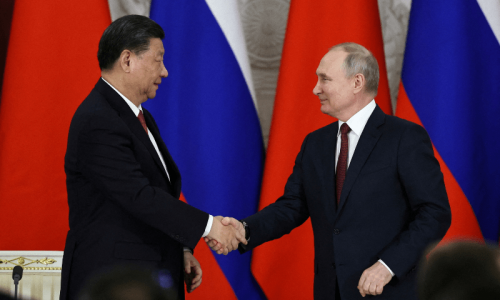BEIJING: Paying 399 yuan ($48) for a pair of jeans may seem extravagant to the average Chinese consumer with his meager 640 yuan of monthly disposable income, but not to Jimmy Xue.
Not if the jeans have a cool Jack & Jones label on them, and not if the 22-year-old art student knows they are the real thing.
“They are about four times the price of local jeans,” he says, strolling down Beijing’s Wangfujing shopping district with his girlfriend. “But the brand makes it worth it.”
There are 30 million Chinese like Jimmy Xue — young, urban and affluent — and they have enough purchasing power to force the world’s biggest companies to change fundamental, long-held views about sound marketing strategies.
One day their demanding attitude and love of choice may even make them bold enough to change the country’s politics, some observers speculate.
A unique combination of historical circumstances have turned them into a generation like no other.
They are the products of China’s one-child policy, which was introduced in 1979 and has coincided with a period of unseen wealth creation, ending the dreary existence that was urban China in the days of late chairman Mao Zedong.
“The one-child policy almost forced people to spoil their children,” said David McCaughan, a Tokyo-based consumer researcher for advertising firm McCann-Erickson. “You have a generation who thinks being spoilt is normal.”
As a result, they have expensive tastes, and have already established themselves as a consumer power.
In a country that once celebrated the rough, proletarian look, they spend a monthly 82 yuan on cosmetics alone, according to public relations company Hill and Knowlton.
They want nothing to do with pirated products, even though China is a world leader in intellectual property right infringements.
“They really hate fakes,” said Hung Huang, publisher of Seventeen, a magazine for teenagers.
“When their parents buy them fakes, they are really annoyed, because they think they are ripped off,” she said.
What they do want is real brands, and in great, ever-changing variety, according to market analysts.
Since they have grown up witnessing a society transform itself faster than any other before it, they consider it natural to constantly change tastes and preferences.
“The old dynamics of brand loyalty goes out the window,” said McCaughan. “In other countries it’s a risk to change brands, but in China it’s a risk if you don’t change brands.”
This particular urge for change could potentially have a political consequences at some point in the future, according to some observes.
Many of the high-spending youth are China’s coming elite, groomed at the country’s best high schools and colleges.
“They are a very confident generation, and I think that will affect the way they feel about how much power they have in making social and political and economic decisions in China,” said Hung, the magazine publisher.
China may soon have its own breed of angry young men and women insisting on leaving their mark on society.
“Rage” is considered cool by many Chinese teenagers, who find their role models among the likes of chronically moody rap king Eminem, according to Hung.
Those attending elite schools often speak idiomatic English with an American accent — thanks to native language teachers — and may come across as more cosmopolitan than their parents.
But for all their openness to the outside world, they could eventually turn out to become even more nationalistic than the Chinese before them.
This is what distinguishes the ancient capital of Beijing from Shanghai, China’s most cosmopolitan city, according to Carl C. Rohde, a Dutch researcher of market trends.
“Beijing is definitely also part of the world, but they have a keener sense of preserving their Chinese roots.” he said. “That’s part of their pride as well.”—AFP











































Dear visitor, the comments section is undergoing an overhaul and will return soon.